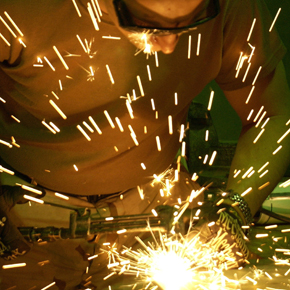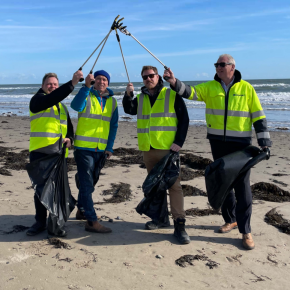
Construction equipment and legislation: Staying safe
Construction is one of the most dangerous industries in the UK; with 35 fatal injuries to workers in the sector in the last year alone. This is why stringent health and safety measures, as well as safety standards, are in place to protect workers and minimise risks.
Plant and construction equipment specialist Eros Hire Tools Limited has provided a summary of areas current legislation covers, and what the standard expectations are for equipment.
Health and safety law
Construction professionals are expected to be trained well enough to operate equipment with an acceptable level of competence.
It is the employer’s responsibility to ensure that workers comply with health and safety regulations, by having the appropriate knowledge, experience and ability to use the equipment properly.
The operation of mobile plant equipment is one of the most common causes of accidental death and injury on construction sites in the UK; ground is often uneven and muddy, and the large nature of equipment driver’s visibility is often obstructed.
It is essential that proper training is given in these circumstances; legislation states that sufficient training must be given to safely operate all equipment, and some areas even require specialist training.
For instance, LOLER training (in line with the Lifting Operations and Lifting Equipment Regulations 1998) ensures awareness of safe ways to operate machinery such as access platforms.
Equipment safety standards
In addition to the standards and legislation controlling safe operation of equipment, CE standards are designed to control safety at the product manufacturing stage.
The expansion of mandatory use of CE marking standards has slowly been increasing through industrial sectors. In September 2013, CE marking became mandatory for industrial doors and fire doors, and there has been a huge push over recent months on clearer classification of steel imports for the construction industry.
Whilst not all construction equipment and machinery requires a CE mark (for example, manually powered machinery), a number of products do currently fall under the product supply directives, making marking a legal requirement.
This includes powered machinery, pressure equipment and low-voltage electrical equipment.
The HSE has published a guide for industry professionals responsible for buying new machinery, which can be read in full here, in addition to an FAQ on EU product supply Directives.
Find out more about Eros Tools Hire
Latest news

11th April 2025
Don’t Do a Dave! It’s Time to Lock FIT Show 2025 in Your Calendar!
It’s that time again – FIT Show is back! You could be forgiven for thinking there won’t be much new to see when FIT Show returns to the NEC from 29 April – 1 May. Wrong!
Posted in Articles, Building Industry Events, Building Industry News, Building Products & Structures, Building Services, Continuing Professional Development (CPD's), Exhibitions and Conferences, Information Technology, Innovations & New Products, Restoration & Refurbishment, Retrofit & Renovation, Seminars, Training
11th April 2025
Insight Data: Boost construction success with project and prospect data
For those working in construction – in whatever capacity – the last few years haven’t been much fun. And according to the latest statistics, it would seem the challenges are continuing – Alex Tremlett, Insight Data’s Commercial Director, has more…
Posted in Articles, Building Industry News, Building Services, Information Technology, news, Research & Materials Testing
11th April 2025
ASSA ABLOY EMEIA: Learn how to tackle the security challenges of digitalising access with insights from industry experts
In a new series of videos, experts in various specialisms within ASSA ABLOY share their expertise on digital access, including the complexities to overcome and the range of benefits for those who get digital access right…
Posted in Access Control & Door Entry Systems, Architectural Ironmongery, Articles, Building Industry News, Building Products & Structures, Building Services, Doors, Facility Management & Building Services, Information Technology, Innovations & New Products, Posts, Restoration & Refurbishment, Retrofit & Renovation, Security and Fire Protection, Videos
10th April 2025
Geberit completes 150 Acts of Kindness
Geberit has raised nearly £14,000 for various charities through its ‘150 Acts of Kindness’ initiative, a year-long programme of fundraising and volunteering to mark the company’s 150th anniversary in 2024.
Posted in Articles, Bathrooms & Toilets, Bathrooms, Bedrooms & Washrooms, Building Industry Events, Building Industry News, Building Products & Structures, Building Services, Charity work, Drainage, Interiors, Pipes, Pipes & Fittings, Plumbing, Restoration & Refurbishment, Retrofit & Renovation
 Sign up:
Sign up: